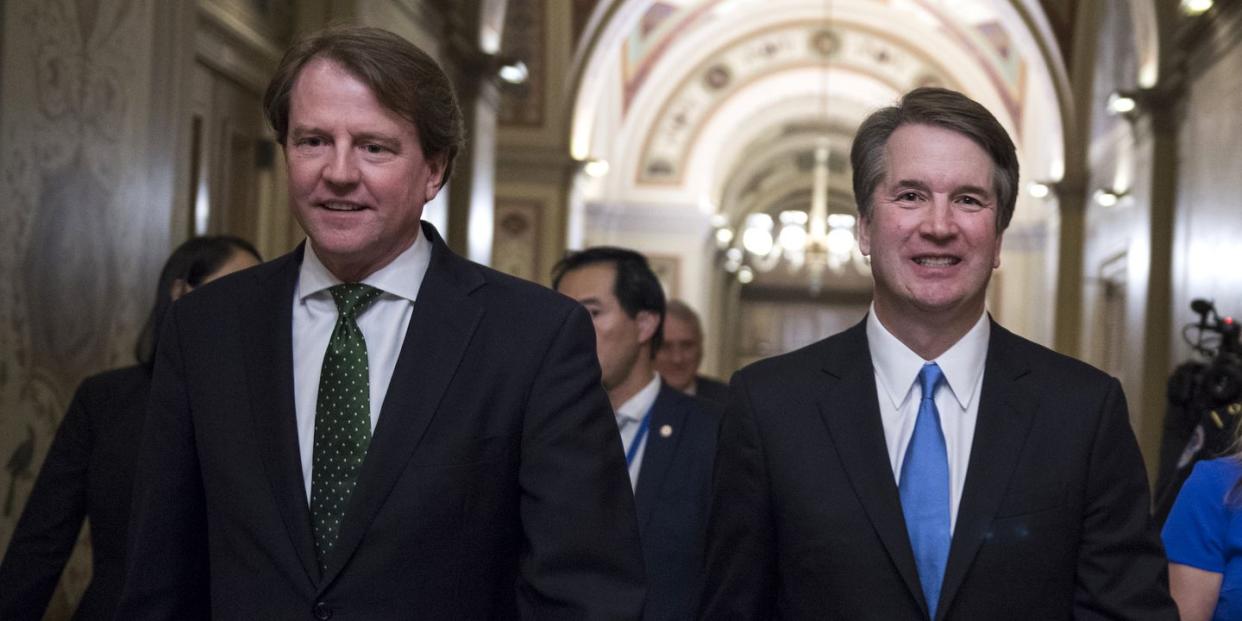Voter Suppression Is Deeply Embedded in the Republican Party. Brett Kavanaugh Helped Put It There.

I had forgotten until very recently that, prior to his assuming Michael Cohen's old job as this administration's king fixer, Don McGahn had been a member of the Federal Election Commission from 2008 to 2013. This was one of the last appointments that C-Plus Augustus made before leaving office, and it had some of the most lasting repercussions, some of which are still shaking the ground under our democratic institutions to this day.
You have to remember that the second Bush Administration remained unshakably paranoid about the dubious way it had been installed in office. At least throughout its first term, and certainly in the days before the 9/11 attacks threw everything up in the air, it had an entirely justified concern about its fundamental legitimacy. Then, along came 2008 and Barack Obama's improbable rise, which was generated by a deluge of authentic political enthusiasm that swamped the political system, much of it coming from people whom the Republicans would rather not see at the polls, thank you very much.
It was this combination of factors-a failed presidency installed illegitimately combined with a spectacular reaction after eight years of failure-that fully embedded voter suppression into the Republican Party as a fundamental characteristic. It had rendered itself incapable of reaching the new voters that had powered the Obama campaign, so it determined, root and branch, to make it as hard as possible for any Democratic candidate to replicate that dynamic.

I would argue that the judicial end of this party-wide commitment to an assault on the franchise can be encompassed by the three Supreme Court decisions-Citizens United, Shelby County, and McCutcheon-through which the accomplishments of the Civil Rights Movement were shredded right along with any sensible campaign-finance laws. We traded John Lewis for the Koch Brothers. Which is where Don McGahn came in. He was the vehicle through which this strategy was implemented at the FEC
As this Quartz report demonstrates, McGahn's primary task at the FEC was to break down the country's system of elections.
McGahn was handpicked by then Senate minority leader Mitch McConnell for the FEC, recalls Ann M. Ravel, who served on the commission from 2013 to 2017. Once there, he quickly whipped Republicans into a solid voting bloc that nearly always opposed additional regulation, oversight, or even investigation. Because the FEC needs four of six commissioner votes to take any action, the net result was a completely broken agency, incapable of enforcing any election laws. “His entire tenure at the FEC was to decimate the ability of the commission to fulfill its job,” Ravel said. Adav Noti, the FEC’s former associate general counsel, said McGahn may have been the most influential FEC commissioner of the century.
And now, of course, McGahn's portfolio in the White House includes sliding judicial nominees through the process-a job Brett Kavanaugh once held in the previous Republican administration. Kavanaugh, as you may have surmised, is awful on campaign-finance reform and just as bad on voting rights.
The entire Republican project ever since the Florida burglary of 2000-in which Kavanaugh was an accessory after the fact-has been to find a way to hang onto power while the party itself is shrinking down to an old, white, Southern base. Every institution of government that the Republicans have controlled for nearly 20 years has been tasked with this, and now they pretty much control all of them, at least until the first week of November. Brett Kavanaugh has been at the center of those efforts. So has Don McGahn. This is the part of the tale that is not about the president* at all.
Respond to this post on the Esquire Politics Facebook page here.
('You Might Also Like',)

